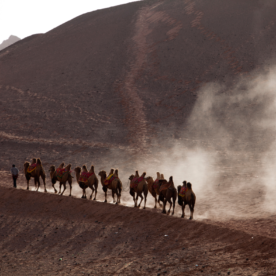Our Travel Tech Guide
We get lots of questions about the tech people should bring on the road. Using your phone or laptop overseas, depending on what country you’re in can be a mine field and an expensive mine field at that, below are some quality tips that should keep you connected with minimal outlay and fuss.
Should I get a local SIM?
In most countries it’s a no brainer. A local SIM is not difficult to get and not expensive to buy. In most cases they can be picked up for a small cost in a local phone shop. Overall, if you’re going to Europe, Africa, South America or Australia a local SIM is the way to go. For the US you can even order one before you go and trust us its best to get it before you go as telco’s in the States still charge a “sign up” fee of about $70USD. This SIM comes with data and calls, and you can choose your package, you can even get one that will be active in Mexico.
The only places where getting a local SIM can be a challenge are places that are overly suspicious of foreigners like Iran or China. You can get a SIM card out of a vending machine at Beijing Airport and some other airports like Guang Zhou have kiosks selling them, but if you don’t get one here, forget it! The only way to get a SIM locally is through a Chinese friend, who can take you to the phone company’s head office and sign you up – make sure you take your passport. You will also not be able to top up, unless you can get said Chinese friend to send you credit via WeChat (Chinese Facebook, among other things). International calls are out too unless you pay an exorbitant fee and have ‘special government permission.’
General rule of thumb for places like India, Sri Lanka, China and Egypt, if you see a vending machine or a kiosk in the airport selling pre-paid SIM cards, no matter how tired you are, if you want a local SIM do it when you arrive. Airport vending machines and kiosks are designed with travellers in mind and the process is easy, whereas on the street in a local phone shop it will be anything but.
Countries in Central Asia are virtually impossible – Uzbekistan, you will need someone to help you and even then, you might have to go to several telco’s before you find someone who is willing to sign you up. Turkmenistan – forget it.
Can I use Social Media?

It’s good to be aware that many countries will block certain sites, especially when it comes to social media….again China is a major culprit here. China will block all of Facebooks platforms, including Instagram and Whatsapp making it very hard to communicate. They also block all of Googles platforms, so beware if you have an email set up through Gmail.
Iran, Turkmenistan and even Turkey are also countries to be aware of on this travel tech front. Turkey is more low key than the others, but Wikipedia is currently blocked. (We aren’t sure of the thinking there!) The best way to get around this is to get yourself a good VPN, what this does is it tricks the local network into thinking you are somewhere else in the world, and thus you get the internet that part of the world sees. Many VPN’s even let you select where you want to dupe the system into thinking you are. For this we can recommend X-VPN which is free and available for download on iOS and Android. There is a paid version which gives you access to a lot of other connections, but we’ve always found the free version satisfactory and if it works in China, it will work anywhere.
How do I find my way?
If you’re like most travellers then with the advent of the modern age, you’ve become increasingly reliant on Google Maps to get around when you travel… again good old China (among other places) blocks this app (and all Google related products and services!). The best way to get around this is with a VPN as mentioned above and a local SIM or with an app called Maps.me. This is fantastic and a very reliable piece of travel tech because IT DOESN’T NEED AN INTERNET CONNECTION!!! All you do is download the app from your app store and type in the country where you are going and download the relevant maps! The maps are then available offline, and the app works exactly like Google Maps without internet!
As a matter of interest, China doesn’t block Apple Maps, however I wouldn’t recommend this as you could end up in a washing powder factory, when you asked for the Forbidden City! It also only allows you to see the city you’re currently in, so if you want to research where your next hotel is in the next place you are visiting, forget it.

Who are you going to call?
This might seem like a bit of an antiquated practice these days, what with email, text and social media all readily available, but don’t underestimate how often you may need to make a phone call. While a local SIM may be great for local calls, it will be really expensive for international calls which are usually the ones you would need to make, how many people could you possibly know your first time in Uzbekistan after all? The best thing to do, is to get yourself a Skype account and actually put credit on it. That way you can use the data feature on your local SIM to call anyone anytime for less than the price of a local call. Whatsapp is also good for this (and free) and lets you keep your own number, even when you have your local SIM in your phone, however you can only call Whatsapp to Whatsapp – Skype with credit allows you to call your Mum & Dad’s landline in Australia from a hotel in Armenia for example. Isn’t technology wonderful!
Should I take my laptop?
This can be a tough one, if you’re not working or seriously blogging while away we would leave it at home, you can probably get by with your phone. The main thing to remember when bringing a laptop along it, one, you have to carry it and two it’s a liability so make sure you have adequate travel insurance that covers its damage or theft.
If you must bring your laptop, for the love of god don’t use a laptop bag. Use a square, non-descript holdall backpack which literally could have anything in it. Don’t pull it out on public transport and if you’re staying in hostels, make sure it’s in the safe they give you or behind the reception desk.
Can I take a drone?

Most of the time it isn’t a case of should I take my drone? But CAN I take my drone?
It can be very tempting to take this rather new technological gadget along for the ride to get those amazing ariel shots. However, be warned! Many destinations do not allow drones to even be brought into the country and its often not the countries you might think. Egypt for example would be an amazing place to bring your drone, how good would an ariel shot of the Great Pyramid be? But no drones are not allowed into Egypt, and it is likely that your flying friend will be confiscated at the airport.
Even if you are allowed to bring a drone into the country, you should also avoid using it at sensitive sights. These sites can often be pretty obvious and you an employ common sense, military bases for example are a no brainer. However, in some destinations the local authorities won’t appreciate drone use around government buildings, certain landmarks and even bridges. So, it pays to be careful.
Good to remember too that a drone, like your laptop is a liability. You should make sure you have proper travel insurance to cover your travel tech and that you never carry your drone in a way that screams ‘I have an expensive piece of travel tech on my person’.
For any other helpful travel tech tips and for travelling on our trips, please don’t hesitate to reach out to us at info@invertedatlas.com








Leave a Reply